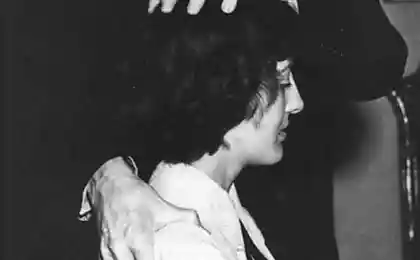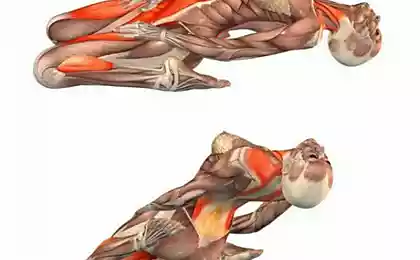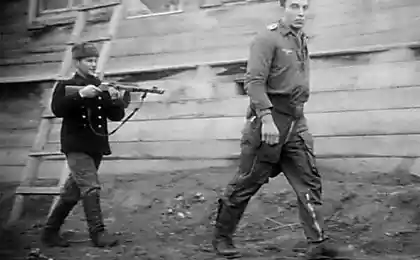779
Why time goes only forward, but not backward?
You have the face of an egg, literally. You tried to juggle a couple of eggs, but something went wrong and now you need to take a shower and send the clothes in the wash. Wouldn't it be faster to just smash the egg Vice versa? If you break it failed for a couple of seconds, why not do the same thing, but in reverse? Just pick up the shell, there brosite the yolk and white. You will have a clean face, clothes, like nothing happened. Why you can break an egg and put it back together — no? To answer this seemingly simple question, we need to go back to the beginning of the Universe.

In fact, "break the egg on the contrary" is not impossible. There is no fundamental law of nature that prohibits us from doing that. Moreover, physicists say that any event in our daily life can happen Vice versa, at any time. Why, then, we do not collect the eggs, not the healed burns, do not tighten the ankle? Why things don't happen the opposite constantly? Why is the future different from the past?
Perhaps this question seems so simple that I even wonder is not worth it. But in fact, trying to find the answer, physicists are turning to the birth of the Universe, look under the hood of atoms, trying to go beyond modern science.
Like many stories about physics, this begins with Isaac Newton. In 1666 an outbreak of bubonic plague forced him to leave Cambridge University and to return with his mother to the village of Lincolnshire. Bored and exhausted from boredom, Newton began to spend much time on physics.
He derived three laws of motion, as well as the famous Maxim: every action has an equal and opposing reaction. He also developed an explanation of how gravity works.
Newton's laws turned out to be surprisingly successful in the description of the world. They explain why apples fall from trees and why the Earth revolves around the Sun. But there are odd detail: they work equally well both forward and backward. If the egg can break Newton's laws say that it can be collected.
Obviously, this is wrong, but almost every theory that was discovered in physics since Newton, has a similar problem. The laws of physics seem to just not worried about moving the time forward or backward, as well as not worried about that you are right-handed or left-handed.
But of course we are worried. Based on our experience, time's arrow, is always directed to the future. "You could mix East and West, but you do not mix up yesterday and tomorrow," says Sean Carroll, physicist, California Institute of technology in Pasadena. But the fundamental laws of physics do not distinguish past and future."
The first person to seriously take up this problem, was the Austrian physicist Ludwig Boltzmann, who lived in the late 19th century. At that time, many ideas that have turned out to be true, then more vigorously debated. In particular, physicists were not convinced — like today — that everything consists of tiny particles, atoms. According to many physicists, the idea of atoms was simply impossible to verify.
Boltzmann was convinced that atoms existed. So he decided to take that idea and explain everything: the glow of the fire, the lungs work, why cold tea, if you blow on it. He thought I would be able to find an explanation for all this, using the concept of atoms. Some physicists were impressed by the work of Boltzmann, but the majority did not accept it. Soon he was expelled from the society for such ideas.
Especially disliked his thoughts about the nature of heat. Perhaps the heat has little to do with the nature of time, but Boltzmann wanted to show that these two things are closely related. At that time, physicists have come up with a theory called thermodynamics, which describes the behavior of heat. For example, thermodynamics describes how a refrigerator can keep food cold on a hot day.
And whether the rights Boltzmann?Opponents of the Boltzmann believed that the heat just can't be described as something else. Heat is just heat. However, Boltzmann set out to prove them wrong. He believed that heat is called the random motion of atoms and that all of thermodynamics can be explained in this context. And he was absolutely right, but spent the rest of his life trying to convince others.
Boltzmann began with attempts to explain something strange: entropy. According to thermodynamics, every object in the world has a certain quantity related to the entropy, and whenever something happens, the amount of entropy is increasing. For example, if you put ice cubes in a glass of water and let them melt, the entropy in the glass will rise.
The growth of entropy does not resemble anything else in physics: this process goes only in one direction. But no one knew why entropy always increases.
Colleagues Boltzmann claimed that it was impossible to explain why entropy always increases. Just growing up and everything. But Boltzmann was not happy, and he was looking for hidden meaning in all of this. The result was a radically new understanding of entropy. And this discovery was so important that it even engraved on the tombstone of a scientist.
Boltzmann discovered that entropy is measured by the number of ways that the atoms, as well as their portable energy, can be arranged. When entropy increases, it means that the atoms become more mixed.
According to Boltzmann, so the ice melts in the water. When the water is in a liquid state, there are many more ways in which water molecules can line up, and many, many more ways to divide the heat energy between the molecules than when water is in solid condition. The ice just there are so many ways to melt and so few ways to stay in the solid state, in the vast majority of cases, the ice will eventually melt.
Similarly, if you drop the cream in your coffee, the cream will be spread on the Cup, since such is the state of higher entropy. The cream is more ways to spread the pieces on coffee than when they were in the same small area.
Entropy, according to Boltzmann, lies in the probability. Objects with low entropy neatly organized, so it is hardly exist. Objects with high entropy is vague, and hence the probability of their existence is high. Entropy always increases, because things are much easier to be messy.
It may sound depressing, especially if you like order in the house. But let the ideas of Boltzmann chance: they seem unable to explain the arrow of time.
Boltzmann approach to entropy explains why it is always increasing. This, in turn, suggests why we always feel the time move forward. If the universe as a whole moves from low entropy to high entropy, we will never see how something goes back.
We do not see how going to the egg, because there are many ways to organize a part of the eggs, and almost all of them lead rather to the broken egg, rather than to the whole. Similarly, the back will not melt the ice, burns was not healed, and the ankle will draw back after stretching.
The definition of entropy by Boltzmann even explains why we remember the past but not the future. Imagine the reverse: you have a recollection of the event, then it happens and the memory disappears. The chances that this will happen to this brain, is extremely small. According to Boltzmann, the future different from the past simply because increased entropy. But annoying his opponents pointed out the error in his reasoning.
Boltzmann said that the entropy increases as your movement in the future, due to the probabilities which govern the behavior of small objects like atoms. But these minor objects themselves obey the fundamental laws of physics that do not draw the line between past and future. Therefore, the argument of the Boltzmann can be flipped on its head. If you claim that the entropy grows as your movement in the future, you can state that entropy will grow as it moves into the past.
Boltzmann thought that the egg will shatter rather than remain intact, it would be reasonable to expect that the whole eggs have to be broken. But there is another interpretation. Intact eggs are so rare and incredible that the eggs must spend most of its time broken, rarely gathering together to for a moment and become whole again after the break. In short, it is possible to use Boltzmann's ideas about entropy, arguing that the future and the past should be similar. But we do not observe, so back to the original position. Why, in the end, there is the arrow of time?
Boltzmann suggested several solutions to this problem. One of the best known as the past hypothesis. It is very simple: at some point in the distant past the universe was in a state of low entropy. If so, the flaw in the reasoning of Boltzmann delayed. The future and the past look different, because the past had a higher entropy than the future. So beat the egg, but not collected.
Seems logical, but a new question arises: why does the past hypothesis need to be true? A state of low entropy are unlikely, why is the entropy of the Universe in the past must be low? The Boltzmann and failed to resolve this issue. Being in a state of almost constant depression, rejected the physical community, he was confident that the work of his life will be forgotten. On a family holiday near Trieste in 1906, Ludwig Boltzmann hanged himself.
His suicide was particularly tragic, because in ten years, physicists have taken the idea of Boltzmann about atoms. Moreover, in subsequent decades, new discoveries have shown that the hypothesis of the past may be found the explanation.
In the 20th century our picture of the Universe has changed dramatically. We found that it has a beginning.
In the days of Boltzmann most physicists believed that the universe is eternal — has always existed. But in the 1920's, astronomers found that the galaxies fly apart. The universe is expanding, guess they. So, once everything was much closer and closer.
Over the next several decades, physicists agreed that the universe began with an incredibly hot and dense point. It rapidly expanded and cooled, forming what now exists. This rapid expansion from a tiny hot Universe called the Big Bang.
All spoke in favor of the hypothesis of the past. "People said, well, it is clear that the young Universe entropy was low," says Carroll. But why entropy was initially low, 14 billion years ago during the Big Bang, no one knows."
In fairness it should be noted that a huge cosmic explosion doesn't sound like something with low entropy. Explosions usually represented anything but order. There were many ways of organizing matter and energy in the young Universe, so it was hot, tiny and expanded. However, as it turned out, the entropy is slightly different, when there are so a lot of energy.

Imagine a huge empty region of space, the center of which is a gas cloud with the mass of the Sun. Gravity pulls the gas together, so the gas becomes compacted and eventually collapses into a star. How is this possible if the entropy is constantly growing? Gas there are more ways of organizing, when it scatters and disperses.
The privilege of the masses, the Answer is that the gravity affects the entropy, but how exactly, physicists still don't understand. In the case of massive objects, to gain weight will mean a higher entropy than to be dense and homogeneous. Therefore the universe with galaxies, stars and planets has a higher entropy than the universe, filled with hot and dense gas.
We have a new problem. The variety of the Universe, which appeared immediately after the Big Bang hot and dense, has a low entropy and, therefore, unlikely. "You can hardly expect to remove this from the bag with all the universes," says Carroll.
How our universe started with such an unlikely state? Even it is not clear what answer we would find. "What would be considered a scientific explanation of the primordial state of the universe?", — asks Tim Modlin, a philosopher of physics at new York University.
There is the idea that before the Big Bang there was something. You can consider this low entropy of the young Universe? Carroll and one of his former students proposed a model in which baby universes are constantly coming into existence, separated from the parent universe and expanding, like our own. These baby universes are starting with low entropy, but the entropy of the "multiple universe" in General will always be higher.
If this is true, young universes only look at the type of low entropy, for we cannot see the big picture. The same can be true for the arrow of time. "This kind of idea suggests that the past of our General picture of the universe was exactly like the distant future," says Carroll.
Wide agreement on the explanation of Carroll there. Only suggestions, but nothing promising. Part of the problem is that our best theories of physics cannot explain the Big Bang. Without explaining what happened during the birth of the Universe, we cannot explain why it has low entropy.
Modern physics relies on two major theories. Quantum mechanics explains the behavior of small things like atoms, and General relativity explains big things like stars. But to combine them is not yet possible.
Therefore, if something is very small and very heavy, like the universe during the Big Bang, physics will be stalled. To explain a young universe, they need to combine the two theories into a "theory of everything". The General theory is likely to explain the arrow of time. Also, this theory will explain how nature builds space and time. But for decades no one don't even come close to theory of everything. Although candidates are certainly there.
The most promising theory of everything may be string theory, which claims that all the subatomic particles are actually made up of tiny strings. String theory also States that space have extra dimensions beyond the three that are rolled to microscopic size, and we live in a kind of multiple universe.
It all sounds pretty weird. However, most physicists see particles in string theory, our best candidate for a theory of everything. However, this does not help us to explain why time moves forward. Like almost any other fundamental physical theory, equations of string theory does not provide a rigorous line between the past and the future. Even if string theory proves correct, it may not explain the arrow of time.
Working with Lee Smolin at the Perimeter Institute in Waterloo, Canada, Marina Cortez is working on alternatives to string theory, which includes the arrow of time at a fundamental level.
Cortes and Smolin believe that the universe consists of a series of absolutely unique events that will never be repeated. Each set of events can only affect events in the next set, building thus the arrow of time. "We hope that if we can apply these types of equations to cosmology, we come to the problem of the initial conditions of the Universe and find that there is nothing special," says Cortez.
This explanation is completely at odds with boltzmanngasse when the arrow of time arises from the laws of probability. "Time is an illusion — says Cortez. — It exists and it really is moving forward."
Most physicists do not see a problem in Boltzmann's explanation. "Boltzmann pointed in the right direction to find a solution, and for a very long time," says David albert, a philosopher of physics at Columbia University in new York. — There is real hope that if you dig deep enough, all will be as it spoke Boltzmann". Carroll agrees. "If the Big Bang will have low entropy, that's it. We will be able to explain all the differences between the past and the future".
Anyway, to explain the arrow of time, we need to explain the state of low entropy at the start of our Universe. This can be useful to any theory, the theory of everything, string theory, the theory of causal series Cortes and Smolin. People are looking for a theory of everything for 90 years. How do we find her? How do we know we found the one you want?
We can test it on something very small and dense. But we can't go back in time to the Big Bang, I can't dive into a black hole and send information from it. What we need to do if we are to explain why the broken eggs are not going back?
Our best hopes for the largest machine in the history of mankind. The large hadron Collider is a particle accelerator, which is 27-kilometer ring at the border of France and Switzerland. He pushes the protons to almost the speed of light. Phenomenal the energy of these collisions produces new particles.
The last two years the TANK was closed for renovations, but in the spring of 2015, he returned and earned with a vengeance. In 2012 he discovered the long-sought Higgs boson. This discovery brought the Nobel prize, but now the TANK wants to beat your own records. If you're lucky, the TANK can shed light on new and unexpected fundamental particles that will point us in the direction of a theory of everything.
It will take several years before scientists will collect and analyze all necessary data. And maybe then we will finally understand why you can't just put this stupid egg off your face.published
P. S. And remember, only by changing their consumption — together we change the world! ©
Join us in Facebook , Vkontakte, Odnoklassniki
Source: hi-news.ru

In fact, "break the egg on the contrary" is not impossible. There is no fundamental law of nature that prohibits us from doing that. Moreover, physicists say that any event in our daily life can happen Vice versa, at any time. Why, then, we do not collect the eggs, not the healed burns, do not tighten the ankle? Why things don't happen the opposite constantly? Why is the future different from the past?
Perhaps this question seems so simple that I even wonder is not worth it. But in fact, trying to find the answer, physicists are turning to the birth of the Universe, look under the hood of atoms, trying to go beyond modern science.
Like many stories about physics, this begins with Isaac Newton. In 1666 an outbreak of bubonic plague forced him to leave Cambridge University and to return with his mother to the village of Lincolnshire. Bored and exhausted from boredom, Newton began to spend much time on physics.
He derived three laws of motion, as well as the famous Maxim: every action has an equal and opposing reaction. He also developed an explanation of how gravity works.
Newton's laws turned out to be surprisingly successful in the description of the world. They explain why apples fall from trees and why the Earth revolves around the Sun. But there are odd detail: they work equally well both forward and backward. If the egg can break Newton's laws say that it can be collected.
Obviously, this is wrong, but almost every theory that was discovered in physics since Newton, has a similar problem. The laws of physics seem to just not worried about moving the time forward or backward, as well as not worried about that you are right-handed or left-handed.
But of course we are worried. Based on our experience, time's arrow, is always directed to the future. "You could mix East and West, but you do not mix up yesterday and tomorrow," says Sean Carroll, physicist, California Institute of technology in Pasadena. But the fundamental laws of physics do not distinguish past and future."
The first person to seriously take up this problem, was the Austrian physicist Ludwig Boltzmann, who lived in the late 19th century. At that time, many ideas that have turned out to be true, then more vigorously debated. In particular, physicists were not convinced — like today — that everything consists of tiny particles, atoms. According to many physicists, the idea of atoms was simply impossible to verify.
Boltzmann was convinced that atoms existed. So he decided to take that idea and explain everything: the glow of the fire, the lungs work, why cold tea, if you blow on it. He thought I would be able to find an explanation for all this, using the concept of atoms. Some physicists were impressed by the work of Boltzmann, but the majority did not accept it. Soon he was expelled from the society for such ideas.
Especially disliked his thoughts about the nature of heat. Perhaps the heat has little to do with the nature of time, but Boltzmann wanted to show that these two things are closely related. At that time, physicists have come up with a theory called thermodynamics, which describes the behavior of heat. For example, thermodynamics describes how a refrigerator can keep food cold on a hot day.
And whether the rights Boltzmann?Opponents of the Boltzmann believed that the heat just can't be described as something else. Heat is just heat. However, Boltzmann set out to prove them wrong. He believed that heat is called the random motion of atoms and that all of thermodynamics can be explained in this context. And he was absolutely right, but spent the rest of his life trying to convince others.
Boltzmann began with attempts to explain something strange: entropy. According to thermodynamics, every object in the world has a certain quantity related to the entropy, and whenever something happens, the amount of entropy is increasing. For example, if you put ice cubes in a glass of water and let them melt, the entropy in the glass will rise.
The growth of entropy does not resemble anything else in physics: this process goes only in one direction. But no one knew why entropy always increases.
Colleagues Boltzmann claimed that it was impossible to explain why entropy always increases. Just growing up and everything. But Boltzmann was not happy, and he was looking for hidden meaning in all of this. The result was a radically new understanding of entropy. And this discovery was so important that it even engraved on the tombstone of a scientist.
Boltzmann discovered that entropy is measured by the number of ways that the atoms, as well as their portable energy, can be arranged. When entropy increases, it means that the atoms become more mixed.
According to Boltzmann, so the ice melts in the water. When the water is in a liquid state, there are many more ways in which water molecules can line up, and many, many more ways to divide the heat energy between the molecules than when water is in solid condition. The ice just there are so many ways to melt and so few ways to stay in the solid state, in the vast majority of cases, the ice will eventually melt.
Similarly, if you drop the cream in your coffee, the cream will be spread on the Cup, since such is the state of higher entropy. The cream is more ways to spread the pieces on coffee than when they were in the same small area.
Entropy, according to Boltzmann, lies in the probability. Objects with low entropy neatly organized, so it is hardly exist. Objects with high entropy is vague, and hence the probability of their existence is high. Entropy always increases, because things are much easier to be messy.
It may sound depressing, especially if you like order in the house. But let the ideas of Boltzmann chance: they seem unable to explain the arrow of time.
Boltzmann approach to entropy explains why it is always increasing. This, in turn, suggests why we always feel the time move forward. If the universe as a whole moves from low entropy to high entropy, we will never see how something goes back.
We do not see how going to the egg, because there are many ways to organize a part of the eggs, and almost all of them lead rather to the broken egg, rather than to the whole. Similarly, the back will not melt the ice, burns was not healed, and the ankle will draw back after stretching.
The definition of entropy by Boltzmann even explains why we remember the past but not the future. Imagine the reverse: you have a recollection of the event, then it happens and the memory disappears. The chances that this will happen to this brain, is extremely small. According to Boltzmann, the future different from the past simply because increased entropy. But annoying his opponents pointed out the error in his reasoning.
Boltzmann said that the entropy increases as your movement in the future, due to the probabilities which govern the behavior of small objects like atoms. But these minor objects themselves obey the fundamental laws of physics that do not draw the line between past and future. Therefore, the argument of the Boltzmann can be flipped on its head. If you claim that the entropy grows as your movement in the future, you can state that entropy will grow as it moves into the past.
Boltzmann thought that the egg will shatter rather than remain intact, it would be reasonable to expect that the whole eggs have to be broken. But there is another interpretation. Intact eggs are so rare and incredible that the eggs must spend most of its time broken, rarely gathering together to for a moment and become whole again after the break. In short, it is possible to use Boltzmann's ideas about entropy, arguing that the future and the past should be similar. But we do not observe, so back to the original position. Why, in the end, there is the arrow of time?
Boltzmann suggested several solutions to this problem. One of the best known as the past hypothesis. It is very simple: at some point in the distant past the universe was in a state of low entropy. If so, the flaw in the reasoning of Boltzmann delayed. The future and the past look different, because the past had a higher entropy than the future. So beat the egg, but not collected.
Seems logical, but a new question arises: why does the past hypothesis need to be true? A state of low entropy are unlikely, why is the entropy of the Universe in the past must be low? The Boltzmann and failed to resolve this issue. Being in a state of almost constant depression, rejected the physical community, he was confident that the work of his life will be forgotten. On a family holiday near Trieste in 1906, Ludwig Boltzmann hanged himself.
His suicide was particularly tragic, because in ten years, physicists have taken the idea of Boltzmann about atoms. Moreover, in subsequent decades, new discoveries have shown that the hypothesis of the past may be found the explanation.
In the 20th century our picture of the Universe has changed dramatically. We found that it has a beginning.
In the days of Boltzmann most physicists believed that the universe is eternal — has always existed. But in the 1920's, astronomers found that the galaxies fly apart. The universe is expanding, guess they. So, once everything was much closer and closer.
Over the next several decades, physicists agreed that the universe began with an incredibly hot and dense point. It rapidly expanded and cooled, forming what now exists. This rapid expansion from a tiny hot Universe called the Big Bang.
All spoke in favor of the hypothesis of the past. "People said, well, it is clear that the young Universe entropy was low," says Carroll. But why entropy was initially low, 14 billion years ago during the Big Bang, no one knows."
In fairness it should be noted that a huge cosmic explosion doesn't sound like something with low entropy. Explosions usually represented anything but order. There were many ways of organizing matter and energy in the young Universe, so it was hot, tiny and expanded. However, as it turned out, the entropy is slightly different, when there are so a lot of energy.

Imagine a huge empty region of space, the center of which is a gas cloud with the mass of the Sun. Gravity pulls the gas together, so the gas becomes compacted and eventually collapses into a star. How is this possible if the entropy is constantly growing? Gas there are more ways of organizing, when it scatters and disperses.
The privilege of the masses, the Answer is that the gravity affects the entropy, but how exactly, physicists still don't understand. In the case of massive objects, to gain weight will mean a higher entropy than to be dense and homogeneous. Therefore the universe with galaxies, stars and planets has a higher entropy than the universe, filled with hot and dense gas.
We have a new problem. The variety of the Universe, which appeared immediately after the Big Bang hot and dense, has a low entropy and, therefore, unlikely. "You can hardly expect to remove this from the bag with all the universes," says Carroll.
How our universe started with such an unlikely state? Even it is not clear what answer we would find. "What would be considered a scientific explanation of the primordial state of the universe?", — asks Tim Modlin, a philosopher of physics at new York University.
There is the idea that before the Big Bang there was something. You can consider this low entropy of the young Universe? Carroll and one of his former students proposed a model in which baby universes are constantly coming into existence, separated from the parent universe and expanding, like our own. These baby universes are starting with low entropy, but the entropy of the "multiple universe" in General will always be higher.
If this is true, young universes only look at the type of low entropy, for we cannot see the big picture. The same can be true for the arrow of time. "This kind of idea suggests that the past of our General picture of the universe was exactly like the distant future," says Carroll.
Wide agreement on the explanation of Carroll there. Only suggestions, but nothing promising. Part of the problem is that our best theories of physics cannot explain the Big Bang. Without explaining what happened during the birth of the Universe, we cannot explain why it has low entropy.
Modern physics relies on two major theories. Quantum mechanics explains the behavior of small things like atoms, and General relativity explains big things like stars. But to combine them is not yet possible.
Therefore, if something is very small and very heavy, like the universe during the Big Bang, physics will be stalled. To explain a young universe, they need to combine the two theories into a "theory of everything". The General theory is likely to explain the arrow of time. Also, this theory will explain how nature builds space and time. But for decades no one don't even come close to theory of everything. Although candidates are certainly there.
The most promising theory of everything may be string theory, which claims that all the subatomic particles are actually made up of tiny strings. String theory also States that space have extra dimensions beyond the three that are rolled to microscopic size, and we live in a kind of multiple universe.
It all sounds pretty weird. However, most physicists see particles in string theory, our best candidate for a theory of everything. However, this does not help us to explain why time moves forward. Like almost any other fundamental physical theory, equations of string theory does not provide a rigorous line between the past and the future. Even if string theory proves correct, it may not explain the arrow of time.
Working with Lee Smolin at the Perimeter Institute in Waterloo, Canada, Marina Cortez is working on alternatives to string theory, which includes the arrow of time at a fundamental level.
Cortes and Smolin believe that the universe consists of a series of absolutely unique events that will never be repeated. Each set of events can only affect events in the next set, building thus the arrow of time. "We hope that if we can apply these types of equations to cosmology, we come to the problem of the initial conditions of the Universe and find that there is nothing special," says Cortez.
This explanation is completely at odds with boltzmanngasse when the arrow of time arises from the laws of probability. "Time is an illusion — says Cortez. — It exists and it really is moving forward."
Most physicists do not see a problem in Boltzmann's explanation. "Boltzmann pointed in the right direction to find a solution, and for a very long time," says David albert, a philosopher of physics at Columbia University in new York. — There is real hope that if you dig deep enough, all will be as it spoke Boltzmann". Carroll agrees. "If the Big Bang will have low entropy, that's it. We will be able to explain all the differences between the past and the future".
Anyway, to explain the arrow of time, we need to explain the state of low entropy at the start of our Universe. This can be useful to any theory, the theory of everything, string theory, the theory of causal series Cortes and Smolin. People are looking for a theory of everything for 90 years. How do we find her? How do we know we found the one you want?
We can test it on something very small and dense. But we can't go back in time to the Big Bang, I can't dive into a black hole and send information from it. What we need to do if we are to explain why the broken eggs are not going back?
Our best hopes for the largest machine in the history of mankind. The large hadron Collider is a particle accelerator, which is 27-kilometer ring at the border of France and Switzerland. He pushes the protons to almost the speed of light. Phenomenal the energy of these collisions produces new particles.
The last two years the TANK was closed for renovations, but in the spring of 2015, he returned and earned with a vengeance. In 2012 he discovered the long-sought Higgs boson. This discovery brought the Nobel prize, but now the TANK wants to beat your own records. If you're lucky, the TANK can shed light on new and unexpected fundamental particles that will point us in the direction of a theory of everything.
It will take several years before scientists will collect and analyze all necessary data. And maybe then we will finally understand why you can't just put this stupid egg off your face.published
P. S. And remember, only by changing their consumption — together we change the world! ©
Join us in Facebook , Vkontakte, Odnoklassniki
Source: hi-news.ru
Rolls of roasted peppers with cheese and herbs
Bodyweight exercises, which many people underestimate























